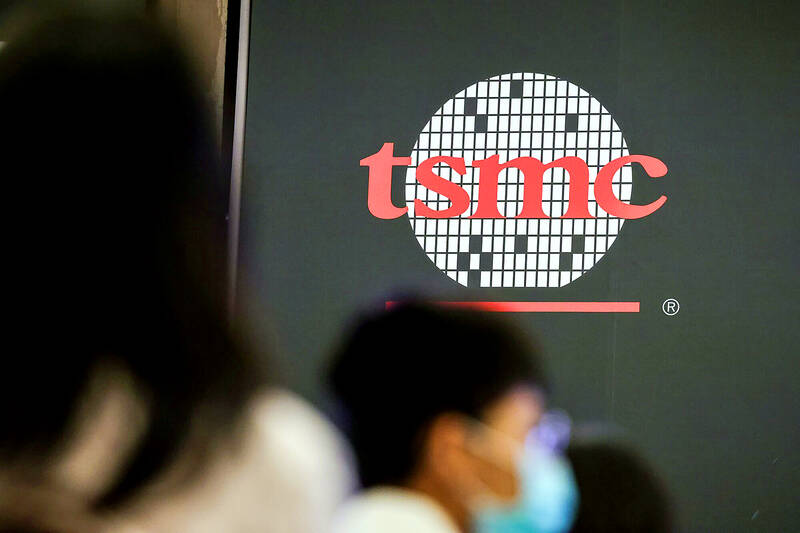Taiwan Semiconductor Manufacturing Co (TSMC, 台積電) last quarter consolidated its leadership position after its share of the global foundry market topped 60 percent, TrendForce Corp (集邦科技) said yesterday.
The contract chipmaker’s market share was 58.5 percent in the final quarter of last year, the Taipei-based researcher said in a report.
TSMC’s revenue fell 16.2 percent sequentially during the January-to-March period to US$16.74 billion, as flagging demand for smartphones and notebook computers reduced utilization of its advanced 7-nanometer, 5-nanometer and 4-nanometer node technologies, TrendForce said.

Photo: Cheng I-Hwa/Bloomberg
TSMC would likely see a slower decline in revenue this quarter, it said.
Samsung Electronics Co, the second-biggest foundry service provider, saw its revenue plummet 36.1 percent quarterly to US$3.45 billion, due to lower utilization of its 8-inch and 12-inch fabs, TrendForce said.
The South Korean company is expected to report the first revenue contribution from its 3-nanometer technology this quarter, the researcher said.
GlobalFoundries Inc ranked third, replacing United Microelectronics Corp (UMC, 聯電), as it benefited from rising orders for chips used in vehicles and industrial devices, as well as the defense sector and government agencies in the US.
GlobalFoundries has said revenue last quarter fell 12.4 percent quarterly to US$1.84 billion.
The company is expected to report a flat second quarter on the back of steady demand for chips used in aerospace, Internet of Things applications and vehicles, TrendForce said.
UMC’s revenue fell 17.6 percent last quarter from the previous quarter, due to weak demand for products made using its 28-nanometer, 22-nanometer and 40-nanometer technologies.
The chipmaker is also expected to see flat revenue this quarter or a slight increase from the previous quarter, TrendForce said.
UMC’s utilization rate of its 8-inch fabs is likely to fall below 60 percent this quarter, as customers scaled back orders for power management chips and microcontrollers, while the utilization rate of its 12-inch fabs could reach 80 percent on the back of rush orders for 28-nanometer chips used in TVs, the report said.
Taiwanese foundries Powerchip Semiconductor Manufacturing Corp (力積電) and Vanguard International Semiconductor Corp (世界先進) fell to eight and ninth place respectively with regards to their global market share, due to sluggish demand for chips used in consumer electronics, TrendForce said.
Overall, the world’s top 10 foundry companies would likely post smaller revenue declines this quarter, as customers have started rebuilding inventory, albeit cautiously, the researcher said.
However, end-market demand remained weak and the companies’ factory utilization would be supported solely by rush orders for Wi-Fi chips and touch-and-display chips, it said.

KEEPING UP: The acquisition of a cleanroom in Taiwan would enable Micron to increase production in a market where demand continues to outpace supply, a Micron official said Micron Technology Inc has signed a letter of intent to buy a fabrication site in Taiwan from Powerchip Semiconductor Manufacturing Corp (力積電) for US$1.8 billion to expand its production of memory chips. Micron would take control of the P5 site in Miaoli County’s Tongluo Township (銅鑼) and plans to ramp up DRAM production in phases after the transaction closes in the second quarter, the company said in a statement on Saturday. The acquisition includes an existing 12 inch fab cleanroom of 27,871m2 and would further position Micron to address growing global demand for memory solutions, the company said. Micron expects the transaction to

Vincent Wei led fellow Singaporean farmers around an empty Malaysian plot, laying out plans for a greenhouse and rows of leafy vegetables. What he pitched was not just space for crops, but a lifeline for growers struggling to make ends meet in a city-state with high prices and little vacant land. The future agriculture hub is part of a joint special economic zone launched last year by the two neighbors, expected to cost US$123 million and produce 10,000 tonnes of fresh produce annually. It is attracting Singaporean farmers with promises of cheaper land, labor and energy just over the border.

US actor Matthew McConaughey has filed recordings of his image and voice with US patent authorities to protect them from unauthorized usage by artificial intelligence (AI) platforms, a representative said earlier this week. Several video clips and audio recordings were registered by the commercial arm of the Just Keep Livin’ Foundation, a non-profit created by the Oscar-winning actor and his wife, Camila, according to the US Patent and Trademark Office database. Many artists are increasingly concerned about the uncontrolled use of their image via generative AI since the rollout of ChatGPT and other AI-powered tools. Several US states have adopted

A proposed billionaires’ tax in California has ignited a political uproar in Silicon Valley, with tech titans threatening to leave the state while California Governor Gavin Newsom of the Democratic Party maneuvers to defeat a levy that he fears would lead to an exodus of wealth. A technology mecca, California has more billionaires than any other US state — a few hundred, by some estimates. About half its personal income tax revenue, a financial backbone in the nearly US$350 billion budget, comes from the top 1 percent of earners. A large healthcare union is attempting to place a proposal before